Serving 1,420 students in grades Kindergarten-12, John Adams Academy - Lincoln ranks in the top 50% of all schools in California for overall test scores (math proficiency is top 30%, and reading proficiency is top 30%).
The percentage of students achieving proficiency in math is 42% (which is higher than the California state average of 33%). The percentage of students achieving proficiency in reading/language arts is 53% (which is higher than the California state average of 47%).
The student:teacher ratio of 24:1 is higher than the California state level of 21:1.
Minority enrollment is 37% of the student body (majority Hispanic), which is lower than the California state average of 80% (majority Hispanic).
Quick Stats (2025)
- School Type: Charter School
- Grades: Kindergarten-12
- Enrollment: 1,420 students
- Student:Teacher Ratio: 24:1
- Minority Enrollment: 37%
- Overall Testing Rank: Top 50% in CA
- Math Proficiency: 42% (Top 30%)
- Reading Proficiency: 53% (Top 50%)
- Science Proficiency: 37% (Top 30%)
- Source: National Center for Education Statistics (NCES), CA Dept. of Education
School Overview
John Adams Academy - Lincoln's student population of 1,420 students has grown by 563% over five school years.
The teacher population of 60 teachers has grown by 566% over five school years.
School Type
Grades Offered
Grades Kindergarten-12
Total Students
1,420 students
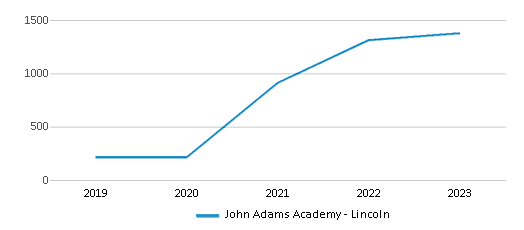
Gender %
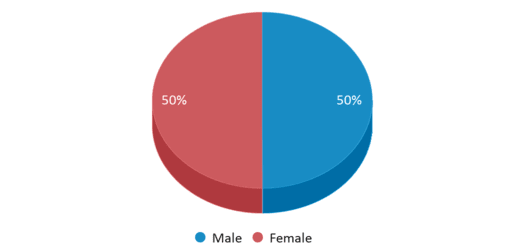
Total Classroom Teachers
60 teachers
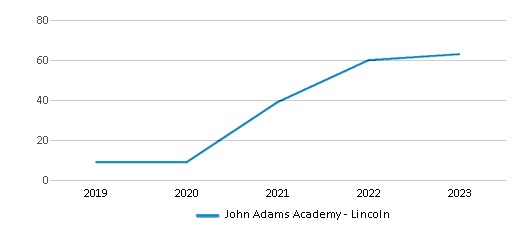
Students by Grade
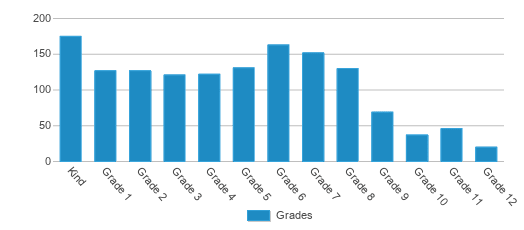
School Rankings
John Adams Academy - Lincoln ranks within the top 50% of all 9,602 schools in California (based off of combined math and reading proficiency testing data).
The diversity score of John Adams Academy - Lincoln is 0.55, which is less than the diversity score at state average of 0.63. The school's diversity has stayed relatively flat over five school years.
Overall Testing Rank
#2922 out of 9602 schools
(Top 50%)
(Top 50%)
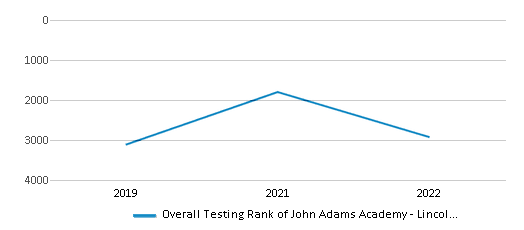
Math Test Scores (% Proficient)
42%
33%
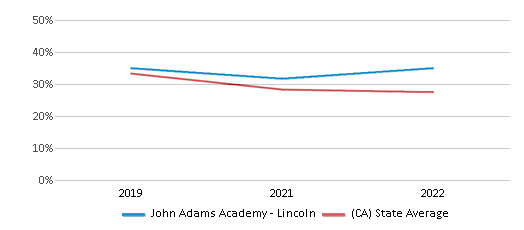
Reading/Language Arts Test Scores (% Proficient)
53%
47%
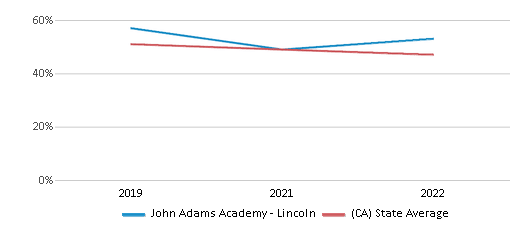
Science Test Scores (% Proficient)
37%
29%
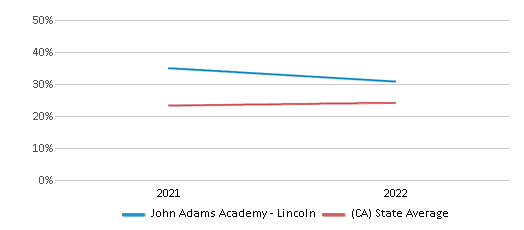
Student : Teacher Ratio
24:1
21:1
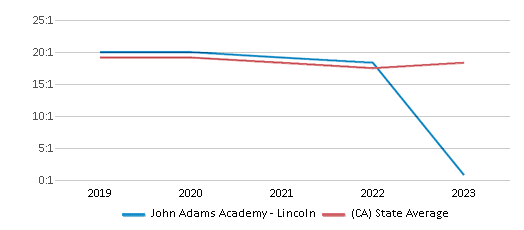
American Indian
n/a
1%
Asian
5%
12%
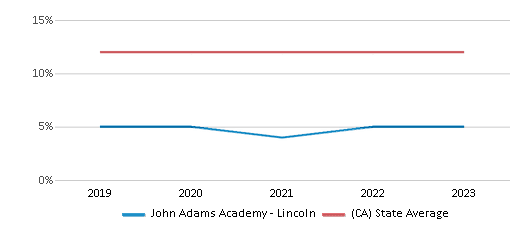
Hispanic
23%
56%
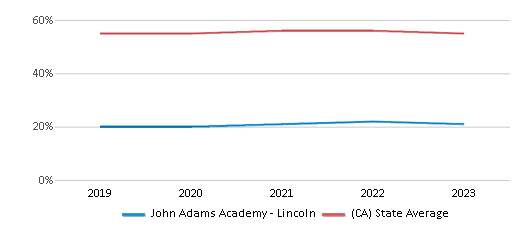
Black
1%
5%
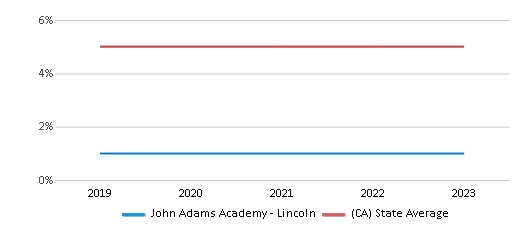
White
63%
20%
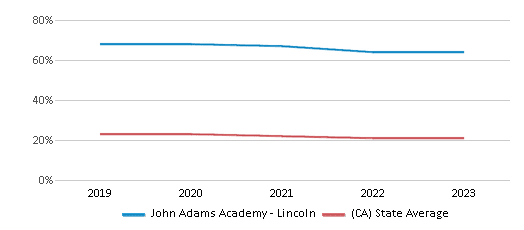
Hawaiian
1%
n/a
Two or more races
7%
6%
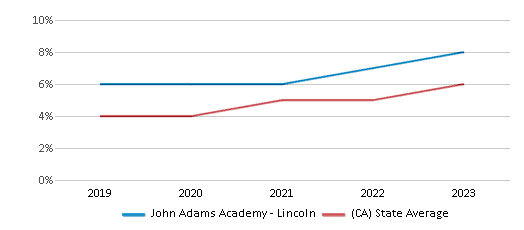
All Ethnic Groups
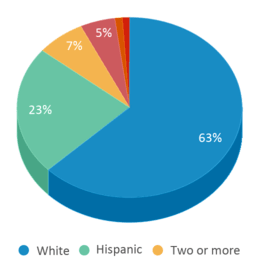
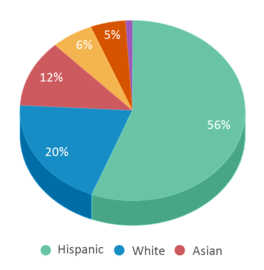
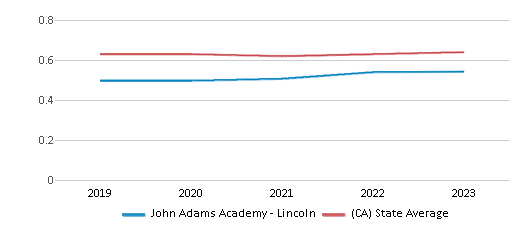
Eligible for Free Lunch
19%
54%
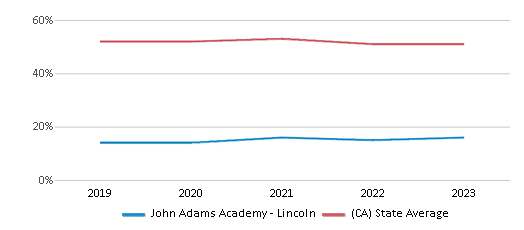
Eligible for Reduced Lunch
1%
8%
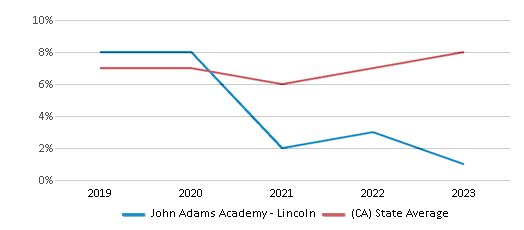
School Statewide Testing
School District Name
Source: National Center for Education Statistics (NCES), CA Dept. of Education
Profile last updated: 02/09/2025
Frequently Asked Questions
What is John Adams Academy - Lincoln's ranking?
John Adams Academy - Lincoln is ranked #2922 out of 9,602 schools, which ranks it among the top 50% of public schools in California.
What percent of students have achieved state testing proficiency in math and reading?
42% of students have achieved math proficiency (compared to the 33% CA state average), while 53% of students have achieved reading proficiency (compared to the 47% CA state average).
How many students attend John Adams Academy - Lincoln?
1,420 students attend John Adams Academy - Lincoln.
What is the racial composition of the student body?
63% of John Adams Academy - Lincoln students are White, 23% of students are Hispanic, 7% of students are Two or more races, 5% of students are Asian, 1% of students are Black, and 1% of students are Hawaiian.
What is the student:teacher ratio of John Adams Academy - Lincoln?
John Adams Academy - Lincoln has a student ration of 24:1, which is higher than the California state average of 21:1.
What grades does John Adams Academy - Lincoln offer ?
John Adams Academy - Lincoln offers enrollment in grades Kindergarten-12
What school district is John Adams Academy - Lincoln part of?
John Adams Academy - Lincoln is part of John Adams Academy - Lincoln School District.
School Reviews
3 7/21/2021
NOTE: SOME THINGS YOU NEED TO KNOW BEFORE ENROLLING YOUR CHILD IN THIS SCHOOL ARE THINGS YOU NEED TO CONSIDER:1.) Very patriotic: If you are acceptable and okay about this then by all means go ahead, but if an exceptionally patriotic and classical learning algorithm isn''t your thing then please think about that before letting your child attend this school. Learning about American history is great, but be warned, the subject is this school's main focus. Thus the name ''John Adams Academy''. Much of this school's architectural features are also American-sized (the layout of the building, the pictures of presidents, and patriotic paintings on the walls). There have been many references to patriotism throughout the school year, so again, if this is not your thing then maybe you should reconsider. 2.) A white-centered school: If you are looking for diversity in race and identity in this school, know that that is probably not what you''re going to get. Not sure if that is because of the area or the American message the school is trying to deliver, but take that into accountability if diversity is one of your top priorities. You can find students of color every once in a while, but there are usually only two or three POC students in each class. 3.) This school requires most of it''s students (I know for sure 6-12) to memorize and recite it''s ten core values every morning, such as: 1.) Appreciation of our national heritage 2.) Public and private virtue 3.) Emphasis on mentors and classics 4.) Scholar empowered learning 5.) Fostering creativity and entrepreneurial spirit 6.) High standards of academic excellence 7.) Modeling what we teach 8.) Abundance mentality 9.) Building a culture of greatness 10.) Self governance, personal responsibility and accountability4.) Flag Ceremonies are every once in a while, where kids usually stand outside, listen to a speech or two from a teacher, raise the flag, and do the pledge there. Sometimes children also sing patriotic songs in Leadership.5.) Uniforms: One of the main things that stands out about this school is the uniform policy. Uniforms are required, only with exceptions for things such as spirit days or class rewards (option of jeans for the day, etc.). For all age groups, a polo shirt is usually $25, a skirt $32-$40, and khakis and shorts $25-$30. You also have the choice to purchase outerwear and accessories. Black shoes (with no white toes) are definitely something your child should own in their closet.6.) As of this year, there are not many clubs/activities available, since this is a relatively newer campus. This review will age so it might be different in the future but as of right now there''s not a very large selection of activities. No band/drama club. 7.) Distance learning can be stressful and a lot harder when there are kids in person. It''s hard for the teachers who video call in class to focus on two groups at once. P.E. is very complicated. 7-8th graders used a BYU online learning program for P.E. and Latin so be aware that if your child will be using the program it is complicated and the student will most likely be stressed out and possibly disorganized. For distance learning alone, please try to work on procrastination with your child because it is not the same environment as in-person. Doing daily checkups on your kid is a good way to go. DEFINITE PROS:1.) From my experience the teachers are nice and respectful while constructing discipline and many are not afraid to put their foot down.2.) I can tell they try to learn smarter, not harder. This does not mean that (for upperclassmen) they lack homework. 3.) Some laid-back, smart and funny teachers4.) Teachers not very open about religious/political views, they like students to think for themselves. 5.) The main focus is on what's best for the kids6.) Teachers usually have a good relationship with the kids7.) You get a good education out of one year. A lot of information. 8.) Students are mainly nice and respectfulThank you! Hoped this helped.
Review John Adams Academy - Lincoln. Reviews should be a few sentences in length. Please include any comments on:
- Quality of academic programs, teachers, and facilities
- Availability of music, art, sports and other extracurricular activities
Recent Articles

What Is A Charter School?
Explore the world of charter schools in this comprehensive guide. Learn about their history, how they operate, and the pros and cons of this educational innovation. Discover key facts about charter schools, including admission policies, demographics, and funding, as well as what to look for when considering a charter school for your child.

10 Reasons Why High School Sports Benefit Students
Discover the 10 compelling reasons why high school sports are beneficial for students. This comprehensive article explores how athletics enhance academic performance, foster personal growth, and develop crucial life skills. From improved fitness and time management to leadership development and community representation, learn why participating in high school sports can be a game-changer for students' overall success and well-being.

February 05, 2025
Understanding the U.S. Department of Education: Structure, Impact, and EvolutionWe explore how the Department of Education shapes American education, from its cabinet-level leadership to its impact on millions of students, written for general audiences seeking clarity on this vital institution.





